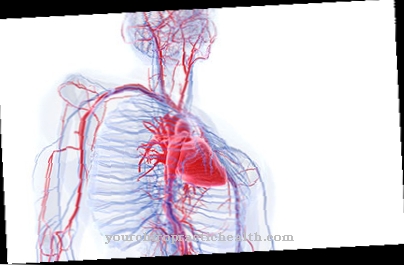A funicular myelosis is a degenerative breakdown of spinal cord structures as a result of a chronic vitamin B12 deficiency. The disease manifests itself mainly from the fifth decade of life.
What is funicular myelosis?

© Olga Che - stock.adobe.com
The degeneration of specific areas of the spinal cord (posterior cord tract, pyramidal side cords) is referred to as funicular myelosis, which is usually due to a long-term vitamin B12 deficiency.
This leads to a breakdown of the medullary sheaths surrounding the nerve cells of the spinal cord. The nerve tracts are exposed and, as with uninsulated electrical lines, the risk of short circuits is increased. Symptomatic manifestations of funicular myelosis include unsteady gait and dizziness as a result of the regression of the posterior cords, abnormal sensations through to paralysis, pain (especially in the legs), rapid fatigue when walking, impotence, urinary retention and burning tongue.
In addition, impairment of the optic nerve and / or the nerve tracts leading to the brain can lead to visual disturbances. In addition, funicular myelosis is associated with pernicious anemia (enlarged erythrocytes with a simultaneous reduction in concentration).
causes
Funicular myelosis is due to a chronic vitamin B12 deficiency. This can result, on the one hand, from insufficient intake through food and, on the other hand, from malabsorption.
The intrinsic factor (glycoprotein) formed in the stomach is required for the absorption of vitamin B12 in the intestine. As a result of chronic gastric diseases (including gastric carcinoma, gastric mucosal inflammation), this can no longer be sufficiently produced, resulting in malabsorption and long-term vitamin B12 deficiency.
In addition, an infection with the fish tapeworm, various diseases such as tumors (including myeloma, leukemia), pathogenic bacterial colonization, Crohn's disease, ulcerative colitis, sprue or celiac disease as well as chronic pancreatic insufficiency can cause a vitamin B12 deficiency and thus funicular myelosis .
Other risk factors for funicular myelosis include a (partial) resection of the stomach, alcoholism, unbalanced diet and certain medications (including anti-epileptic drugs, cytostatics).
You can find your medication here
➔ Medicines for paresthesia and circulatory disordersSymptoms, ailments & signs
Funicular myelosis develops very slowly with a prolonged vitamin B12 deficiency. Before that, symptoms of hyperchromic anemia appear, in which the number of erythrocytes decreases, but the existing red blood cells have an increased concentration of hemoglobin. Only then does funicular myelosis occur, which can have a wide variety of symptoms.
In the majority of cases, sensory disorders occur in the legs, which can be felt as tingling, numbness and painful abnormal sensations. The sense of position, vibration and touch are disturbed. Furthermore, the sensation of temperature and pain can also be impaired. The sensitivity disturbances lead to unsteady gait and faster fatigue when walking.
The progressive destruction of the spinal cord and brain later leads to spastic paralysis in the legs. The arms are also less often affected by the paralysis. At the same time, signs of the pyramid orbit appear, which are expressed by pathological reflexes such as the Babinski reflex. Bladder, bowel and sexual functions can also be disturbed.
Urinary and fecal incontinence as well as impotence are possible. Furthermore, damage to the brain also occurs, which can be noticeable through cognitive limitations. In addition to severe fatigue, psychotic and dementia symptoms are also observed. With early treatment of the vitamin B12 deficiency, the symptoms can still be reversed. However, if treatment starts too late, permanent damage can be expected.
Diagnosis & course
A funicular myelosis is diagnosed on the basis of characteristic symptoms such as pale yellow discoloration of the skin and sclera, Hunter glossitis, sensory disorders and restricted self-reflexes (legs, feet), unsteady gait, positive Romberg's sign, pathological reflexes (including Babinski-, Gordon-, Bechterew- Mendel reflex), disturbed vibration sensation, restricted position sensation, signs of dementia as well as depressive mood up to delusions diagnosed.
In addition, in most cases (over 65 percent) the protein concentration in the liquor (nerve water) is slightly increased, while the nerve conduction speed is slowed (at 75 percent). During a blood test, enlarged erythrocytes and hypersegmented granulocytes as well as a reduced vitamin B12 concentration can be detected.
Furthermore, the homocysteine and methylmalonate levels in the urine are usually increased. The Schilling test can be used to differentiate whether the vitamin B12 deficiency is due to insufficient intake or malabsorption. The course and prognosis of funicular myelosis depend largely on the time of diagnosis and the start of therapy. An early start of therapy ensures regression of the symptoms and a good prognosis, while many symptoms are irreversible in advanced funicular myelosis.
Complications
In most cases, only adults have myelosis. This leads to increased discomfort and sensitivity disorders in the hands and feet of the patient. Sensory disorders also occur due to this disease. These disturbances significantly reduce the patient's quality of life and make everyday life more difficult. In most cases it is no longer possible to carry out various activities without further ado.
There is paralysis in various regions of the body, which can also lead to restricted mobility. Coordination disorders can also complicate everyday life and continue to lead to psychological complaints. It is not uncommon for patients to complain of depression or other psychological disorders. The myelosis must definitely be treated. Without treatment, complete paraplegia usually occurs as the disease progresses.
This has a very negative effect on the quality of life of the person concerned. In most cases, myelosis can be limited and treated relatively well with the help of medication. There are no particular complications. In most cases, the paralysis and restricted mobility will disappear again and there will be no reduced life expectancy.
When should you go to the doctor?
If the person concerned suffers from movement disorders, unsteadiness or dizziness, he should consult a doctor. If he loses his balance and needs help moving to reduce the general risk of accidents, he should see a doctor.
If there are signs of paralysis in the body, repeated weakness, exhaustion and tiredness, there is cause for concern. If changes in vision due to decreased vision or increased sensitivity to light are noticed, these observations should be discussed with a doctor. A reduced libido and, in men, a reduced potency are considered unusual and should be examined medically.
If there are abnormalities in the complexion, sensory disturbances or problems with the perception of sensibility on the skin, it is advisable to consult a doctor. If psychological or emotional disorders arise, a doctor is also required. In the case of persistent depressive mood, a melancholy experience, indifference or reduced drive, a doctor or therapist should be consulted.
If the person concerned notices a restricted reflex reaction and shows symptoms similar to dementia, a doctor should be consulted. Comprehensive medical examinations are necessary to clarify the cause. If relatives notice that the person is showing signs of delusion, they should see a doctor. There is a need for action so that there is no further deterioration in the state of health.
Doctors & therapists in your area
Treatment & Therapy
In the case of funicular myelosis, the therapeutic measures are primarily aimed at reducing the deficiency symptoms through parenteral substitution of vitamin B12.
For this purpose, vitamin B12 is substituted in the context of intravenous or intramuscular injections or infusions. At the start of therapy, a daily injection of vitamin B12 (e.g. 1 mg / d IM hydroxycobalamin in the first two weeks) is required. Due to the good storage capacity of the liver for vitamin B12, the injections or infusions can gradually be reduced to weekly, then monthly and finally quarterly applications.
Substitution therapy can stop the disease from progressing and the symptoms from worsening. If only the myelin sheaths are involved, the symptoms are usually reversible. If the axon cylinders are also damaged, residual symptoms persist in most cases. In some cases (especially with mildly pronounced funicular myelosis) the symptoms can worsen at the beginning, so that good compliance (adherence to therapy) on the part of the person concerned is required.
If there is also pronounced anemia, potassium and iron should be substituted to prevent a relative deficiency. In some cases, supplemental or monotherapeutic folic acid substitution may be indicated to correct haematological disorders caused by funicular myelosis.
You can find your medication here
➔ Medicines for paresthesia and circulatory disordersprevention
Funicular myelosis can be prevented by avoiding a vitamin B12 deficiency. In addition to the consistent treatment of possible underlying diseases, attention should be paid to a varied diet (meat, fish, dairy products). Regular check-ups in the case of chronic inflammatory diseases of the intestinal tract allow an increased vitamin B12 requirement to be recognized at an early stage and accordingly prevent funicular myelosis.
Aftercare
With this disease, the options for follow-up care are very limited. In most cases, the disease cannot be completely treated, so that the patient is dependent on lifelong therapy to permanently alleviate the symptoms. The main focus here is on the early detection and treatment of this disease in order to avoid complications.
Usually, those affected rely on medication to reduce the lack of vitamin B12. It is important to ensure correct and, above all, regular intake. In the case of children, parents must ensure that they are taken correctly and consider possible interactions with other medicinal products.
Furthermore, regular examinations of the internal organs are also very useful in order to detect damage to the liver or kidneys at an early stage. In many cases, those affected are also dependent on the intake of iron or potassium, as there is a deficiency in the body of these elements too. A balanced and healthy diet can also alleviate these symptoms. Often, contact with other patients is also useful, as this can lead to the exchange of information that can make everyday life easier. Life expectancy usually remains unchanged.
You can do that yourself
Funicular myelosis is particularly easy to treat in the early stages. It usually arises from a lack of vitamin B12. The therapy takes place via a precisely dosed supply of the missing vitamin B12, which the doctor takes in consultation with the patient.
We strongly advise against self-therapy and uncontrolled intake of vitamin B12. Patients should urgently follow the instructions of their doctor and discuss the further course of therapy with him on an ongoing basis. This also includes regular check-ups.
In close cooperation with the treating doctor, the chances are good that the funicular myelosis, if it is still in its early stages, will be completely healed. After healing has taken place, another dose of vitamin B12 at long intervals can have a preventive effect.
If the disease is more advanced when it is diagnosed, it can still be treated well. In most cases, further progression can be prevented and symptoms are alleviated. It is also very important not to undertake any self-therapy, but always to communicate with the treating doctor.
A healthy and balanced lifestyle with a varied diet, exercise in the fresh air and the consistent avoidance of addictive substances strengthens the body's immune defense. In this way, the patient can do a lot to improve his or her health.

.jpg)






















.jpg)



